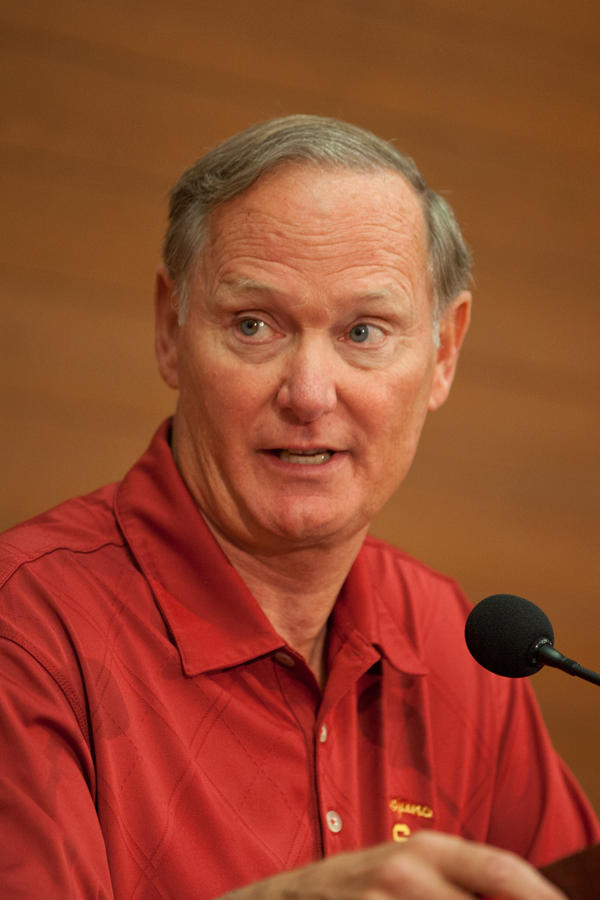NCAA rulings are often out of touch
The NCAA announced Tuesday that Division I programs will be allowed to give athletes (including walk-on athletes) unlimited meals and snacks, according to a report from ESPN. This change comes partially off the heels of Connecticut guard Shabazz Napier’s comments regarding hunger following his team’s NCAA National Championship victory.

Tense relationship · USC athletic director Pat Haden has criticized the NCAA for its alleged mishandling of USC football’s recent sanctions. – Ralf Cheung | Daily Trojan
“Sometimes, there’s hungry nights where I’m not able to eat, but I still gotta play up to my capabilities,” Napier told a stunned audience. Napier’s quandary was one shared with quite a few student-athletes in a heavily regulated college athletics landscape. As recently as last year, the NCAA had regulated the distribution of snacks to bagels, nuts and fruits to athletes at any time during the day. A reading of that bylaw, however, prohibited the distribution of cream cheese, and the “bagel law,” as it came to be called, quickly became a symbol for the NCAA’s over-regulation of college athletics.
The bagel law was eventually repealed last year, but as of now the NCAA is facing perhaps the biggest push for the de-regulation of amateur athletics since its inception, so it comes as no surprise to me that it would be willing to loosen up a little bit. Though the allowance of snacks and meals seems like a big step for the NCAA, it fixes something that should have never been regulated in the first place. The fact that the NCAA was regulating which foods players were permitted to put in their bodies is unnerving enough. But to tell these athletes they can’t have cream cheese provided with their bagels? No wonder the NBA Draft seems like the ideal place for most college athletes to spend their would-be sophomore year.
Look, I’m not an NCAA athlete, but if I was unable to afford food and some governing body told me that I wasn’t allowed to eat except for specific periods of the day as prescribed by NCAA bylaws, I might take issue with that. What’s actually the problem here isn’t simply the fact that the NCAA seems to be regulating the very means by which athletes sustain themselves on a day-to-day basis — it’s that the constant gamesmanship on the part of the programs contributes to the NCAA’s need to regulate such seemingly trivial matters so tightly.
In a landscape where competition is the name of the game, it only serves to reason that a coach would seek to gain every single advantage permitted by NCAA law. In a way, it forces coaches and their staffs to become legal eagles on the black letter of the NCAA bylaws in order to gain any implicit or “uncovered” advantage not so stipulated specifically by law. Already the concern with the repeal of the bagel law was that coaches would start grilling steaks and serving them as “bagel toppings” to circumvent the NCAA’s draconian meal scheduling regulations.
But the NCAA seems to be clinging to the vast majority of its existing regulations and the amateur status of its athletes, sometimes for its own sake. There is no reason why a governing body that just received $681 million for its television contract for the men’s basketball tournament alone, according to a report from the Indianapolis Star, should be telling athletes what to do or when to do anything. The fact remains that these are athletes who churn the gears of the NCAA’s massive moneymaking machine. Receiving a scholarship is all well and good, but the stress level of some of these athletes are on par with the scrutiny and attention received by their professional counterparts.
I’m not advocating a complete breakdown of the amateur system — ideal as that might be for someone who attends USC, a college flowing with milk, honey and loyal booster money. I’m just saying that the NCAA should have the judicious council in place to learn the difference between regulating recruiting efforts and potential unfair advantages by the coaches, and legislating and over-regulating actual areas of athletes’ lives where they should have a reasonable expectation of freedom.
Let’s face it, the NCAA isn’t going to start paying its players anytime soon when its student-athletes are guaranteed a scholarship. But the experience of receiving a scholarship is diminished by how intensive sports participation can be. The reality of college basketball is that there is, in fact, a much smaller window of time for scholarship-level athletes to dedicate to their studies and the overall college experience.
To so strictly regulate the use of resources and impose completely asinine, punitive sanctions on those programs that do not comply with already-ridiculous rules is just the name of the game at the NCAA. But here’s to hoping that this lift on food restrictions is the first of a handful of de-regulating measures by the NCAA in response to the current fierce advocacy of the abolishment of the amateur system.
Euno Lee is a senior majoring in English literature. He is also the Managing Editor of the Daily Trojan. His column, “Euno What Time it is,” runs Wednesdays.

